Search
Showing 10 of 498 results for group registration
-
SheLeads Campaign – inspiring future Indian learners
Launched on International Women’s Day on 8 March, the SheLeads campaign was developed by Education New Zealand Manapou ki te Ao’s (ENZ's) India-based team. The campaign was multi-pronged and aimed to celebrate women leaders and alumni across various disciplines from New Zealand education providers with a diverse audience of young and mature learners in India.
The campaign was launched on ENZ’s South Asia LinkedIn channel which was then used throughout to highlight the impact and value of a New Zealand education through the sharing of success stories of women leaders in New Zealand and beyond as well as those of Indian women alumni. Education media across several key Indian publications also reported on the campaign to their estimated 58 million readers.
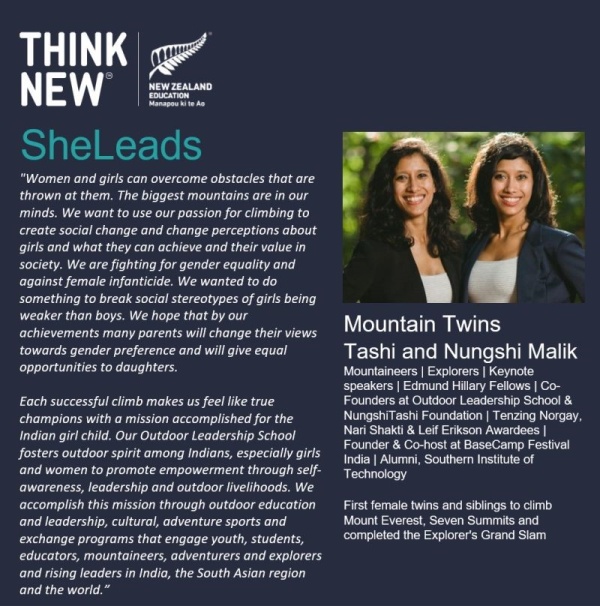
The LinkedIn campaign profiled over 24 women leaders and achieved 105,000 impressions, 1,500 page views, while the ENZ South Asia page gained more than 600 new followers, surpassing the campaign’s targets.
To engage students and lift the NZ education profile amongst this group, a SheLeads debate competition was organised between five leading schools in Delhi. The students were tasked with debating “the underrepresentation of women in STEM”’ and the 50 plus participants were invited to share diverse perspectives and include examples from New Zealand.
Undergraduate learners from over 100 tertiary Indian Institutions were also invited to participate in the campaign through submission of video essays. A shortlist of 10 entries were judged by Professor Carol Mutch from the University of Auckland’s Faculty of Education and Social Work.
Images from the SheLeads debate competition held at Delhi Public School.
Finally, ENZ hosted a virtual workshop on ‘Organisational Change and Resilience’ with school principals and leaders from over 500 schools across India invited to attend. This workshop was facilitated by AcademyEx Founder, Frances Valintine and discussions focused on the innovative approach to learning that leaders must now consider in this rapidly changing world.
The finalists and winners of both competitions were invited to a campaign concluding event at the New Zealand High Commission in New Delhi on May 18. The event featured an engaging line up including an inter-school debate competition for the debate competition finalists, a panel discussion featuring alumni titled “Trailblazers: Women leaders who catalyse change” and the SheLeads Essay Showcase featuring the top three finalists. New Zealand’s High Commissioner to India, H.E Patrick John Rata was on hand to present the winners with their awards in front of guests that included high school counsellors, students, parents, and representatives from New Zealand institutions as well as the Principal of Jesus and Mary College in New Delhi.
ENZ’s Director of Engagement East Asia and India, Jugnu Roy, said that it was a huge privilege being able to interview so many talented women leaders and alumni to showcase their outstanding achievements. She also said that seeing the energy and enthusiasm that the students brought to both competitions was another campaign highlight.
“New Zealand has a proud history of striving for gender equality and continues to improve outcomes for women by strongly supporting women in education and training, utilising women’s skills to grow the economy, and encouraging and developing women leaders.
“I am sure this campaign will inspire our students here in India, particularly our female students, to consider choosing New Zealand as an education destination and follow in the footsteps of these incredible role models,” said Jugnu.
-
Raising the profile of NZ’s PTEs with China education agents
In China, large education agencies play an important role in raising the awareness of a New Zealand education to prospective students and their families. For this reason, 10 director-level representatives from the largest Chinese agencies were invited to join a Famil tour by Education New Zealand Manapou ki te Ao (ENZ) to demonstrate in person how New Zealand offers a modern, high quality and sophisticated learning environment for Chinese students.
In early May, the group visited education providers in Dunedin, Invercargill, and Auckland with a full and varied programme including visits to high schools, a primary school, universities, institutes of skills and technology, and private training establishments. There were also several cultural and tourism activities planned as well as networking events with economic development agencies, private training establishments and English language schools.
A key part of the Famil was the networking function held at the end of the week of activities at Media Design School in Auckland, providing a platform for New Zealand’s Private Training Establishments (PTEs) and English Language Schools (ELS) to engage directly with the visiting agents. Representatives from 24 providers from Auckland, Christchurch and New Plymouth attended the event.
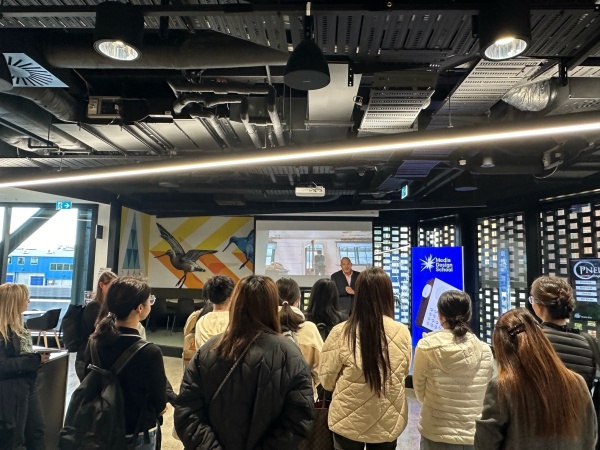
ENZ’s General Manager Māori, Ed Tuari, welcomes the guests to Media Design School with a mihi and welcome.
The event included opening remarks by ENZ’s General Manager Sector Engagement and Innovation, Wendy Kerr, who reiterated to the education agents that New Zealand’s PTEs and ELS play a vital role in New Zealand’s international education ecosystem.
“Our PTEs and ELS are renowned for their innovative programs, real world and practical approach and strong commitment to student success and employability.
These institutions equip students with the skills and knowledge needed to thrive as global citizens in today’s interconnected world.”
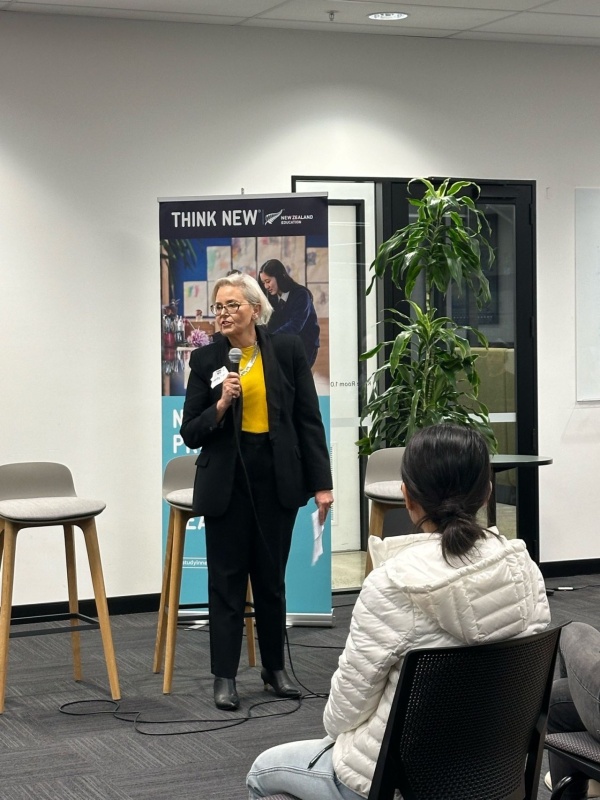
ENZ’S General Manager Sector Engagement and Innovation.
On behalf of ENZ, Wendy also expressed her appreciation to the agents for their ongoing collaboration and support, saying that the agents’ promotion of New Zealand PTEs and ELS opens doors for Chinese students to access world-class education and invaluable international experiences.
A panel discussion took place, focusing on the opportunities and challenges in the China market, featuring three directors moderated by Ruth Cooper, Country Director New Zealand of Media Design School and QTI co-Chair.
During the panel discussion, the agents suggested that providers could enhance their promotion efforts in China by highlighting employment opportunities and utilising Chinese social media to share the most up-to-date information.

Ruth Cooper, Country Director New Zealand of Media Design School and QTI co-Chair (left) facilitates a panel discussion on the opportunities and challenges in the China education market.
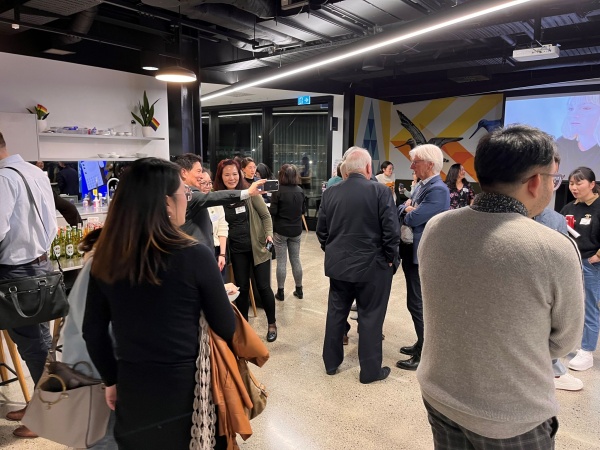
With the formalities out of the way, our education providers had the opportunity to mix and mingle with the education agents.
-
From the CE: Board announces new ENZ CE
Tēnā koutou katoa
Our Board yesterday announced the appointment of Amanda Malu (Ngāi Tahu) as our new Chief Executive. Amanda is currently Deputy Chief Executive Service Delivery at ACC, and formerly Chief Executive at Whānau Āwhina Plunket, leading that organisation through extensive change over six years in the role. She previously held senior marketing and communication roles including at the Tertiary Education Commission, and earlier in her career worked in marketing and international student recruitment in the polytechnic sector. Amanda will take up the role in September. Until then, I will continue as Acting Chief Executive.
This is excellent news. I am sure you will all join me in giving Amanda a very warm welcome to Education New Zealand Manapou ki te Ao and our international education community.

Amanda Malu has been appointed ENZ's new Chief Executive by ENZ's Board.
To the visit of Premier Li. Last Friday I had the privilege of attending three events held as part of Premier Li’s visit to New Zealand. Significantly, Premier Li was accompanied by Minister of Education Huai Jinpeng who led a delegation of Chinese university senior leaders and senior education officials. This is Minister Huai’s second visit to New Zealand within 12 months following his engaging contribution to NZIEC Ki Tua 2023. This is a very special recognition of the close education ties between New Zealand and China.
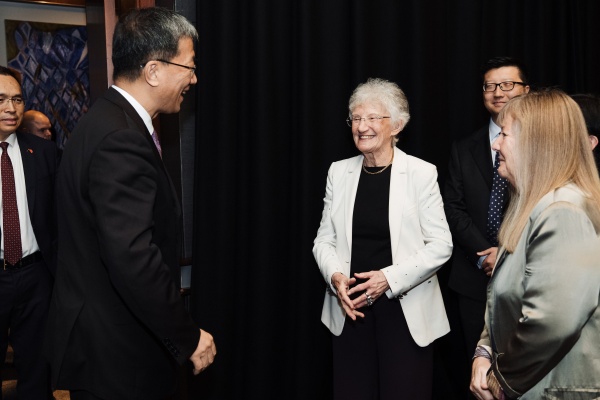
ENZ's Acting Chief Executive Dr Linda Sissons greets Minister Huai with Minister Penny Simmonds and ENZ Regional Director & Counsellor, Greater China (Education), Michael Zhang, prior to the Education Forum (held at the Pullman Hotel, Auckland)
Our Minister for Tertiary Education and Skills, Penny Simmonds and Minister Huai co-chaired a “Looking into the Future: High Level Education Forum”. The Forum was attended by 11 University Presidents from some of the most prestigious universities in China, and all eight of our university Vice-Chancellors. The Forum discussed themes spanning student and academic mobility, research partnerships, innovation and productivity and digital education. A compelling discussion topped off with the signing of twenty institution-level MOUs.
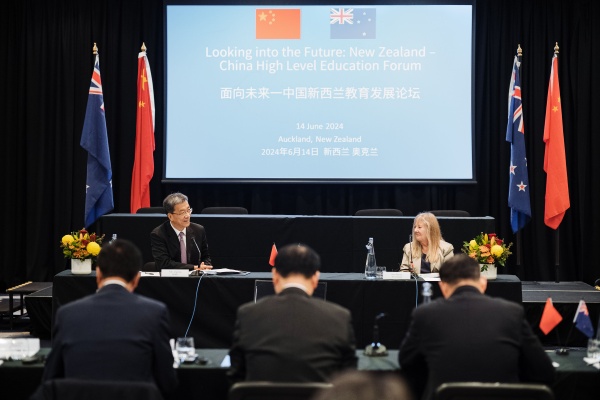
Minister Huai and Minister Simmonds open 'Looking into the Future: New Zealand - China High Level Education Forum
And towards the end of the Forum, Premier Li, our Prime Minister, the Rt Hon Christopher Luxon, as well as the Minister of Education, Erica Stanford, joined the closing ceremony and took an active part in proceedings. This included the Prime Minister presenting the latest Prime Minister’s Scholarships to a group from Canterbury University heading to China and announcing the 2024 recipients of the New Zealand-China Tripartite Research Partnership Fund. Premier Li also announced allocations of scholarships for New Zealand Chinese Language teachers, summer camp places for New Zealand students and donations of Chinese language textbooks.
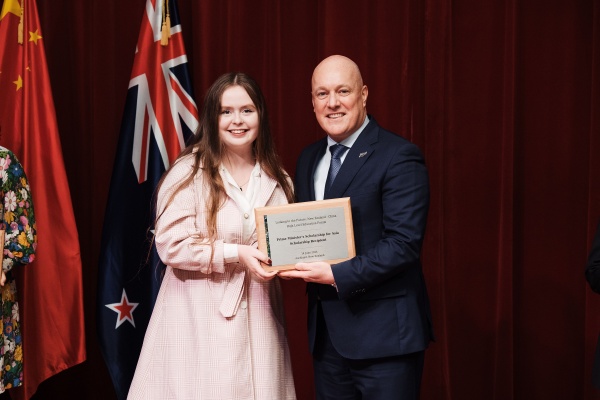
Prime Minister Rt Hon Christopher Luxon with Maia Hosking of the University of Auckland who will begin her programme in China under the Prime Minister's Scholarship for Asia.
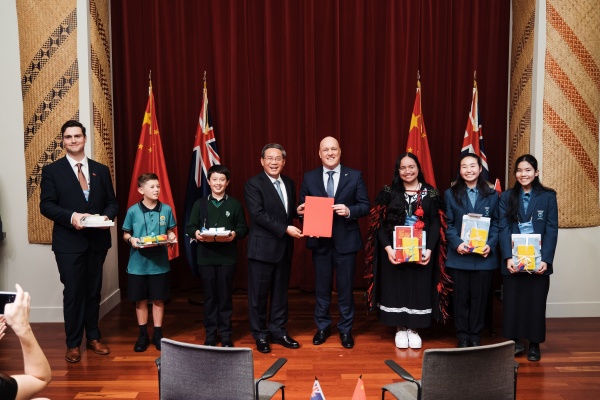
Premier Li (centre left) presents list of announcements to Prime Minister Rt Hon Christopher Luxon (centre right) on stage with six New Zealand students who received Chinese Language books
To close the day, we accompanied our Minister, our Chinese and New Zealand university colleagues, and NZ Inc representatives to the Gala dinner where Prime Minister Luxon called out education among the other vital ties between China and New Zealand.
These special events proved a unique opportunity to showcase our high-quality education offering to China while demonstrating our commitment to enhancing student mobility and future education and research collaboration. It was fantastic. We can all be very proud of education’s contribution to this important relationship.
Ngā mihi nui,
Dr Linda Sissons
Acting Chief Executive
Education New Zealand Manapou ki te Ao
-
Indigenous internationalisation a hot topic across North America
The topic of Indigenous Internationalisation has been proving a popular one at international education events across North America recently. Education New Zealand Manapou ki te Ao (ENZ) Associate Director of Engagement, Natalie Lulia, was asked to share her thoughts alongside experts in panel discussions in both the United States and Canada in May and June. The invitations offered a good opportunity to showcase the important work that Aotearoa New Zealand is doing in indigenous-to-indigenous engagement and internationalisation and our unique approaches to international education.
It was at the 76th annual NAFSA Association of International Educators conference in New Orleans that Natalie was first invited to take part in a panel talk on the subject “What is indigenous-led internationalisation?”. Natalie was joined on the panel by Distinguished Professor Jacinta Ruru, Deputy Vice-Chancellor Māori at the University of Otago, and Paulette Tamati-Elliffe, Manager at Te Rūnanga o Ngāi Tahu.
The panel explored how indigenous and non-Western knowledge and worldviews are essential for intercultural learning through the experiences and work of Māori education experts. The panel provided examples of how indigenous ways of knowing and being can enhance intercultural learning and what Indigenous-led internationalisation looks like in practice.
The panel was moderated by DuBois Jennings, ENZ’s Director of Engagement North America, who noted that the session was extremely well attended.
“It was very inspiring listening to our panel of experts share their thoughts with a very attentive audience. It was so popular that people were standing at the back, which is indicative of how the global international education community values our expertise in this area,” said DuBois.
A te ao Māori approach to education was then the feature of Chief Executive for Te Whare Wānanga o Awanuiārangi, Professor Wiremu Doherty, who delivered a powerful keynote address at the British Columbia International Education Week Conference in Vancouver in June. Natalie joined Professor Doherty in a panel presentation on: ‘Talking Circle: Exploring the intersection between Internationalization, Indigenization, Decolonization and what it means to be Indigenous Serving.’ Also on the panel were Sarah Child and Kelly Shopland from North Island College in British Columbia, Canada who had recently returned from visiting Aotearoa New Zealand with a group of indigenous Canadian students in May.

ENZ’s Natalie Lulia participating in the panel discussion on ‘T Talking Circle: Exploring the intersection between Internationalization, Indigenization, Decolonization and what it means to be Indigenous Serving’ at the British Columbia International Education Week Conference in Vancouver in June.
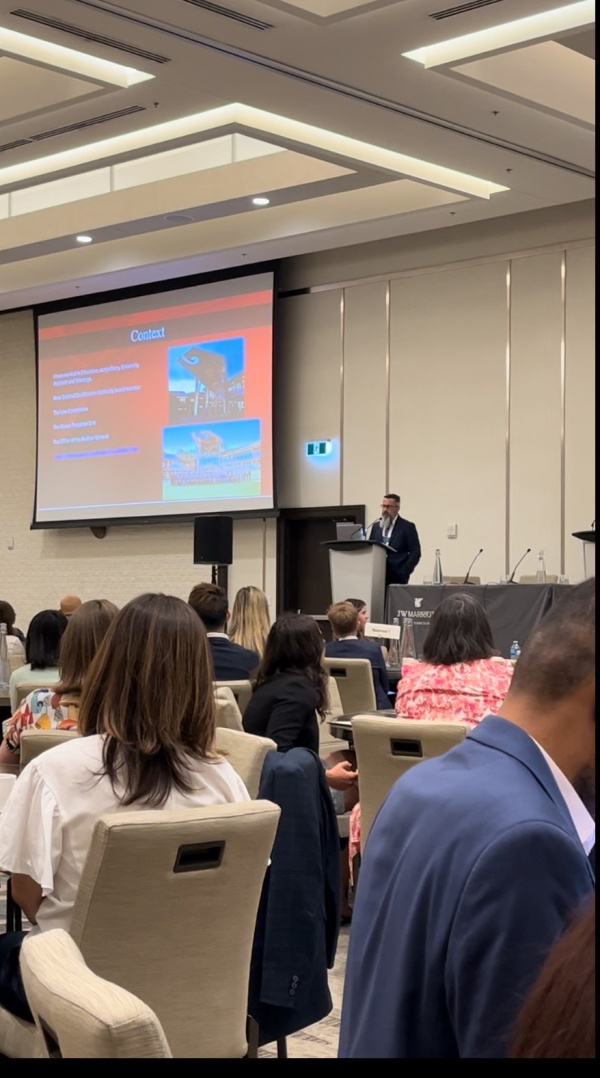
Professor Wiremu Doherty, CE of Te Whare Wānanga o Awanuiārangi, delivers his keynote address on Māori education at the British Columbia International Education Week Conference in Vancouver in June.
Natalie said that it was an honour to have been invited to speak at both events, alongside experts who are the driving forces behind this work within iwi, universities, and government agencies in Aotearoa New Zealand.
“International educators around the world are showing increasing interest in the unique approach we take to international education here in Aotearoa New Zealand. We are seen as a country that is leading the way in indigenous-to-indigenous engagement and internationalisation.
“These opportunities are not just a chance to share our experiences, but importantly an opportunity to learn from each other. We can learn from indigenous educators, thought leaders and communities here too - this is important in building reciprocal and meaningful partnerships,” said Natalie.
Natalie added that “This is a key area that Aotearoa New Zealand can leverage to support student mobility, research collaboration and partnerships with institutions around the globe. ENZ will continue to work with our education partners, Māori and indigenous communities and use these platforms to share our expertise and ultimately grow indigenous international education for our country”.
Upcoming platforms to continue showcasing Aotearoa New Zealand’s approach to indigenous internationalisation will take place at the next Global Inclusion 2024 Annual Conference in Washington DC on 29 October to 1 November. Then in March 2025, the ENZ North America team will be leading a one-day symposium highlighting indigenous international education at the Forum on Education Abroad conference in Toronto, Canada.
If anyone is interested in connecting with the ENZ team in North America to have a chat about this topic or receive further information, please email northamerica@enz.govt.nz.
-
NZ Schools Scholarship Programme offers exciting study path for Vietnamese students
The New Zealand Schools Scholarships (NZSS) is a scholarship programme offered exclusively for Vietnamese students in grades 8 – 10. Since it was first launched in 2019, many young Vietnamese students have studied at New Zealand schools across the country thanks to the support of this Programme. Many of these students have gone on to secure scholarships at prestigious universities in New Zealand and other countries, achieving notable success on their academic paths.
Applications for NZSS 2024 were accepted between 22 January to 17 March 2024 and after several screening rounds, 14 NZSS winners were selected. Each scholarship provides a 50% subsidy on the full-year school tuition fees of the first year of study at a New Zealand secondary school.
A standout aspect of this year’s programme was the dual-opportunity scheme in which aspiring candidates who did not receive the NZSS were able to be considered for other scholarships offered by New Zealand schools. This saw an additional four students awarded other school scholarships bringing the total number of school scholarship awardees to 18.
The group of scholarship winners on the stage at the Awards ceremony.
On 9 June, Education New Zealand Manapou ki te Ao (ENZ) organised the Awards Ceremony and Pre-Departure Briefing to recognise the scholarship winners as well as provide information in preparation for their journey ahead. Mr. Scott James, New Zealand Consul General in Viet Nam, attended and delivered a welcome remark, in which he emphasised the mutual respect and understanding that New Zealand and Viet Nam’s relationship is built upon.
Mr James added that “this scholarship programme signals the New Zealand Government’s continuing commitment to growing the relationship between our two countries.”
From left to right, Mr Ben Burrowes. ENZ’s Acting General Manager - International, NZSS Scholarship winner, Ngoc Han, and Mr. Scott James, New Zealand Consul General in Viet Nam.
Mr. Ben Burrowes, ENZ’s Acting General Manager – International, was also present at the event and awarded the winners a scholarship certificate and offered his congratulations. In his speech he reflected that the first eight months of 2023 saw school enrolments of Vietnamese students increase over that of 2022 to a total of 286.
“Given the care that every parent takes when deciding where their children should continue their education, the rebound for school students following the pandemic naturally took a little longer.
“We know that this number will continue to increase as life resumes its normal pattern, especially as parents look to the future, and what is best for their child’s development and education,” said Mr Burrowes.
For the pre-departure briefing, ENZ provided a brief presentation, followed by former NZSS winners, Thuy Truc (2023), Thao Nguyen (2023) and Tuan Minh (2019) sharing their study experiences with the audience. Representatives from the Vietnamese Students Association in New Zealand, Ms. Trang from HHT magazine who joined the New Zealand familiarisation trip in 2023, and Mr. Phu & Ms. Ngoc – parents of students who are currently studying in New Zealand also spoke.
Feedback from parents and students received by ENZ after the event was positive, with many commenting on how welcome and proud they felt as scholarship winners. We look forward to welcoming these students to New Zealand very soon!
-
Education New Zealand targets $4.4 billion by 2027
Education New Zealand Manapou ki te Ao (ENZ) today announced its plan to grow the international education sector over the next three years. The strategy, which aims to build the economic contribution of international education to $4.4 billion by 2027, focuses on growing and diversifying the number of international students studying in New Zealand.
“International education has made a good start to its recovery with more than 69,000 enrolments in the first full academic year since borders reopened and universities returning to 86% of pre-pandemic numbers,” said ENZ Acting Chief Executive Dr Linda Sissons today.
“The government has a goal of doubling the value of export earnings in ten years and international education has its part to play.”
“In the first year of the strategy the focus is putting additional investment into markets we have identified with growth potential. These include India, Viet Nam, and the Philippines, and some specific sectors within markets like Japan and Thailand. We need to start now to grow awareness of New Zealand in these markets if we are to achieve our growth targets. Moving forward, we will continue to seek growth through diversifying markets while maintaining our strength in traditional markets such as China and India.”
“As a small agency with a finite budget, ENZ needs to be very smart and maximise every opportunity for New Zealand,” said Dr Sissons. “We look to use the potential of Scale, Impact, and Leverage as the measuring rods for everything we do, as we commit to the Government’s Export Double goal”.
The strategy is the result of extensive consultation with the international education sectors, partner Government agencies and comes on the back of a productive 12 months for Education New Zealand.
In the past 12 months Education New Zealand student attraction activities have delivered:
-
More than two million visits to the Study with New Zealand website
-
Added more than 69,000 prospective students to its database
-
More than 22,000 individuals have made enquiries to providers regarding study
-
Our business-to-business activities targeting education agents delivered 33 webinars to over 1,800 participants
-
18 in-country events delivered in five countries (Thailand, South Korea, Japan, Vietnam, China)
-
The New Zealand International Education Conference KI TUA 2023 to 599 delegates
-
50 new indigenous to indigenous networks and partnerships
-
Sector satisfaction with ENZ topped 77%
ENZ’s offshore team provides significant support to overseas visits by representatives of the international education sector and the New Zealand government, building and deepening relationships said Dr Sissons. In 2024 this included a visit by representatives of all New Zealand Universities to India in February, and ENZ supporting the education component of the Prime Ministerial Trade Missions to Southeast Asia and Japan.
The agency also supports education visits to New Zealand. Very recently this included the visit of Chinese Premier Li Qiang, which included China’s Education Minister Huai Jinpeng.
It was the second visit by Minister Huai to New Zealand in ten months, and highlighted the strong momentum our bilateral education relationship. In 2023 ENZ also delivered the Prime Minister’s Scholarships to Asia and Latin America (PMSA/LA) which sees New Zealanders travel internationally for learning experiences and administers the Manaaki New Zealand Scholarship programme for the Ministry of Foreign Affairs and Trade (MFAT). The Manaaki Scholarships offers scholarships to eligible citizens from developing countries to study at a New Zealand education institution or university or at a Pacific university.
In 2023 these important programmes have awarded:
-
118 individual PMSA/LA scholarships
-
20 group PMSA/LA scholarships
-
NZIEC KI TUA 2023 delivered with 599 delegates
-
861 Manaaki New Zealand Scholarships awarded
“I am very pleased and proud of the results the team at Education New Zealand Manapou ki te Ao has delivered alongside the sector. We have more to do,” said Dr Sissons.
For further information:Justin Barnett | Director of Communications, Education New Zealand Manapou ki te Ao
+64 21 875 132
About Education New Zealand Manapou ki te Ao (ENZ) https://www.enz.govt.nz/
ENZ is the government agency dedicated to helping Aotearoa New Zealand realise the social, cultural, and economic benefits of international education. Our role is to promote New Zealand as a high-quality education destination offering excellent education and student experiences and to encourage New Zealand students to study overseas.
With approximately 105 staff in 16 locations around the world, ENZ works closely with New Zealand’s diverse education sector which includes schools, English language providers, Private Training Establishments, Institutes of Technology and Polytechnics (Te Pūkenga), and universities. Internationally, we work with a range of education stakeholders, including government agencies and education providers to identify and encourage sustainable growth opportunities for New Zealand’s education sector.
-
-
Māori and First Nations people connect during University of Toronto visit
18 indigenous students and two indigenous staff from the University of Toronto’s ‘First Nations House’ were invited to Aotearoa New Zealand for a week-long visit at Tirorangi Marae at the base of Mount Ruapehu in July.
The purpose of the visit was to enhance cross-cultural understanding between Māori and First Nations and Métis peoples and is significant as empowering iwi and hapū in the international education space is an important Te Tiriti obligation for ENZ, as an Aotearoa New Zealand government agency.
The visit took place during the time of ‘Puanga’ which is when the single star rises higher in the sky than the Matariki star cluster and is recognised by iwi and hapū that can’t see the Matariki cluster from their location.

Māori and First Nations and Métis people have ’sharing circles’ as a common way to teach and learn.
The group participated in a wide range of activities in the area while staying at the marae. They were then welcomed to Te Whanganui-a-Tara by the ENZ Wellington office, visiting Te Tiriti o Waitangi at Archives New Zealand Te Rua Mahara o te Kāwanatanga and and Te Herenga Waka — Victoria University of Wellington, before finishing their trip in Whakatū (Nelson) with some adventure tourism activities.

Indigenous students Kieren and Bailey from the University of Toronto sampling Wellington’s outdoors with ENZ's Craig Rofe.
The First Nations and Métis members of the group experienced what living on a marae was like and were also immersed in how a tribe engages with the environment, and how iwi businesses, local council and government agencies such as the Department of Conservation (DOC) operate in the field with iwi partnership.

Iwi people sharing lake Rotokura’s healing power, a wāhi tapu (sacred place) for the local tribe.
Dr Craig Rofe, ENZ’s Kaitohutohu Matua Māori – Senior Advisor Māori, said that during the visit, Māori and First Nations and Métis people were able to compare the similarities and differences of their contexts to grow understand of their respective challenges and successes.
“The First Nations people’s struggles to overcome racism and prejudice resonated with tangata whenua, in particular the intentional elimination of language and the current mechanisms of revitalisation.
“Many stories shared with together showed the everyday trauma that resides in each of us and how, as indigenous people, we try to navigate these obstacles to make a better world for the next generation”, said Dr Rofe.
The trip motivated the students to connect more with their languages and culture upon their return.
Kenzie, from the Mohawk tribe said “when we meet again, I’ll be able to talk to you in my language, I’m declaring it!”.
Katherine from the Eskasoni First Nation tribe said “My experience connecting with the Ngāti Rangi revealed the transformative power of global Indigenous connections. Participating in ceremonies such as Hautapu and visiting Mount Ruapehu was particularly moving. Listening to their stories of ancestral ties to the land and taking part in traditional ceremonies that emphasized community and connection to the environment deepened my own personal understanding. This experience inspired me to initiate conversations with elders in my own community about our traditional land management practices.”
This experience also highlights the important offerings that Māori, and indeed indigenous knowledge, has to offer to international education. In particular, and not exclusively, the deep connection that indigenous peoples have with the environment and therefore natural obligation of care.

First Nation student, Alexis, discovers the origins, medicinal, spiritual and mechanical properties of harakeke (flax).
Sustainable practices and programmes can benefit from indigenous inclusion and perspectives, especially with the large-scale impacts of global warming and general pollution in many countries. The co-governance structure that Ngāti Rangi iwi and DOC work with as part of post Te Tiriti Settlement was used as an example of decolonised solutions within our New Zealand context.
There have been discussions between ENZ, Ngāti Rangi iwi, and the University of Toronto about an ongoing relationship and considering what a reciprocal engagement might look like moving forward.
Nāku te ika i hī, nāku anō i whakatau
Ki te haere, whāia i te Pare-i-te-taitonga, tērā taku ika.
This is a Ngāti Rangi iwi reference to the Ruapehu mountain being the ‘pillar post’ of the ‘Fish’ (North Island).
-
NZ-GRADS scholars come together at annual science meeting
The NZ-GRADS programme awards scholarships to students from developing countries who are passionate about researching topics related to greenhouse gas emissions from agriculture systems, primarily livestock. The scholarship programme is funded by MPI and managed by Education New Zealand Manapou ki te Ao (ENZ).
The seven scholars were supported to travel to Wellington by MPI, while ENZ organized the travel and scholar engagement for the day. This event not only allowed scholars the opportunity to hear cutting-edge research relevant to their own fields, but to also to connect with each other, and fellow scholars and researchers. The scholars are currently studying towards their PhDs across the motu at the University of Auckland, Massey University, the University of Waikato, the University of Otago and Lincoln University.
ENZ Director Scholarships Carla Rey Vesquez said getting the scholars together in-person enabled lively discussion between the scholars and attendees.
“I was delighted to witness the excitement and ideas emerging from the conversations. The NZ GRADS scholars are a vibrant group of people dedicated to creating a greener future both in New Zealand and back home.
“Attending in-person was critical in cementing their understandings of research in their own fields and the wider science community in New Zealand,” she added.
The event was very well received by scholars, with Kirill Bogdanov commenting “this was an excellent experience to be around people who support science and especially listen to the questions they asked - it is valuable to know what the investors expect from your research.”
“New Zealand is giving me a marvellous opportunity to perform high-quality research, communicate with interesting people, and be on my own adventure in a land far, far away,” he added.
-
New brand identity of the Manaaki New Zealand Scholarship Programme launching next week
Education providers and suppliers who are part of the programme will be able to start using the new brand’s design assets from The ENZ BrandLab from 23 October.
The Manaaki New Zealand Scholarship website will also prominently showcase the refreshed brand from next week.

The new Manaaki logo consists of three parts. The tohu is on the left, the Manaaki wordmark is placed in the middle, with the Aotearoa New Zealand fernmark on the right-hand side.
New Zealand Ministry of Foreign Affairs and Trade - Manatū Aorere (MFAT) Scholarships Unit Manager, Alexandra Grace, said it was important for the new brand identity to reflect the transformational nature of Manaaki scholarships to build people’s skills and support them to contribute positively to their communities and countries.
“The new brand is an exciting step forward to unify the Manaaki New Zealand Scholarship Programme’s visual identity to appeal to prospective scholars who are most aligned with our Programme’s values,” Alexandra said.

He parirau is one of the key patterns of the new brand. It is inspired by the takarangi (spiral) and parirau (feathers).
The brand identity development and working group involved kaimahi Māori from MFAT, Education New Zealand Manapou ki te Ao and Indigenous Design Innovation Aotearoa (IDIA) who gifted a specially crafted whakatauākī* for the Manaaki New Zealand Scholarship Programme.
The whakatauākī ‘He Parirau Toro Ao’ translates to ‘stretch your wings to the world’.
ENZ’s Senior Advisor, Rautaki Māori, Craig Rofe, said the whakatauākī is a profound taonga and gift to the Manaaki New Zealand Scholarship Programme.
“It beautifully anchors the programme in āhua Māori (Māori ways of being).”
“We are also pleased with how the whole process of creating the new brand has been steeped in āhua Māori. The way everyone involved in the project used whakawhanaungatanga – the specific act of getting to know one another before we started our work – and wānanga, coming together to meet, discuss and deliberate, every step of the way, made all the difference,” Craig said.


Digital banners showing the application of the brand and whakatauākī.
The new brand was developed following research and interviews with 29 scholars and alumni, and a survey covering 627 people.
The research surfaced three compelling principles for the Manaaki New Zealand Scholarship Programme – manaakitanga, empowering people, communities and countries, and fostering enduring connections.
ENZ’s Manaaki Scholarships Manager, Nancy Linton, said the concept of manaakitanga is integral to the Manaaki New Zealand Scholarships Programme – not only by name, but also in the way that scholars are supported during their entire journey, from application and study to their return home.
“The manaaki we show our visitors by embracing them like part of our ‘whānau’ or family is visible in the way our educational providers extend that support to Manaaki scholars and alumni, who really value it as part of their study experience.
“I am pleased with the way we have incorporated this core element of the Programme, among others, into the new brand identity,” Nancy said.
A brand transition period is in place through 28 February 2025, to allow providers enough time to switch to new brand assets.
Visit The ENZ BrandLab to access new design assets for the Manaaki New Zealand Scholarship Programme after 24 October.
* Whakatauākī are proverbs where the person who said it first is known, as opposed to whakataukī, which are proverbs whose origin cannot be traced to a person.
-
NZ forges fruitful partnership with Paraná state, Brazil’s education powerhouse
Following a visit to New Zealand universities in September by a delegation of authorities from Paraná state, Brazil, the Latin America Centre of Asia-Pacific Excellence organised a reciprocal trip for a group of New Zealand educational representatives to go to Curitiba, Paraná’s capital city. The purpose of the visit was for the New Zealand delegation to get a closer look at the research structure of this southern Brazilian state and discuss future pathways for collaboration between Brazilian and New Zealand students and researchers.
The public higher education system of Paraná is made up of seven state universities and three federal institutions spread across several cities, with in-person and distance learning. They are quality research and teaching institutions, with substantial scientific production capacity and academic prestige. Paraná state has a population of roughly 11 million people.
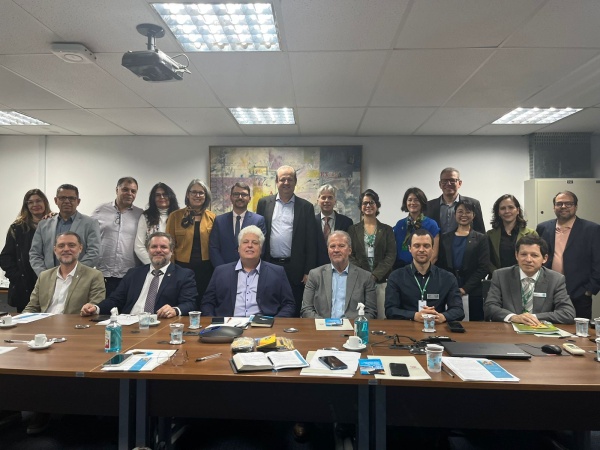
New Zealand delegation meets with representatives of the State Secretariat for Science, Technology and Higher Education of Paraná and deans of state universities.
During the meetings in the capital of Paraná, held in mid-October, there were several discussions with deans and vice-deans of state universities, representatives of the State Secretariat for Science, Technology and Higher Education and the Araucária Foundation, a state-funded institution that focuses on promoting high-level scientific research.
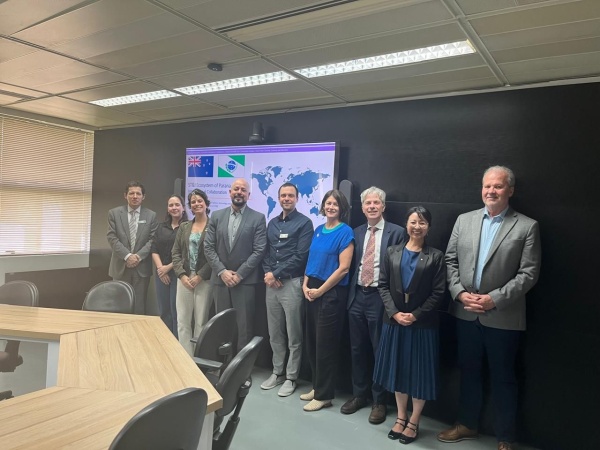
New Zealand delegation at the Araucária Foundation, which funds scientific research
The meetings were attended by Secretary Aldo Nelson Bona and his team; market development manager of Education New Zealand Manapou ki te Ao (ENZ) in Brazil, Bruna de Natale; Nicole Freeman, from the Latin America Centre of Asia-Pacific Excellence; as well as representatives from 3 of the 8 New Zealand universities: Frank Bloomfield, from The University of Auckland, Leonel Alvarado, from Massey University and Jannik Haas, from the University of Canterbury.
Frank Bloomfield is deputy Vice-Chancellor, Research and Innovation at the University of Auckland. During the visit he highlighted the importance of collaborating internationally with other universities to undertake research and how one cannot conduct research in your own country alone.
"I’ve had the pleasure of leading two delegations to Brazil this year. Firstly, in April for the Faubai conference, when we also had the opportunity to talk to some professors from leading Brazilian universities. And now this visit.
“Despite our differing geographic and population sizes, the research priorities of our countries are very similar. We have heard from our colleagues here in Brazil that we have similar priorities but also similar problems,” said Frank.
“An example of this is in agriculture and how we need to think about using new techniques and new technologies such as genomics to improve our productivity in agriculture. This also applies to a whole host of different areas in which our priorities are similar including freshwater and culture, engineering, and chemical sciences, for example,” added Frank.”


